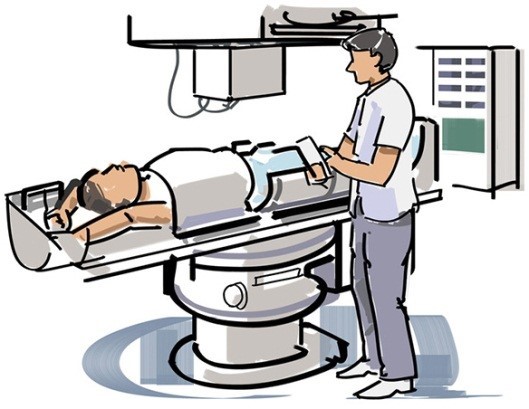Radio therapy
What is radiotherapy
Radiotherapy is a method in which cancer is treated by directly giving high-voltage rays to the focus of cancerous tissue. The aim of this treatment is to radiate radiation with maximum power to the cancerous tissue and a very small amount to the surrounding tissues so that it does not have any side effects on the surrounding healthy tissue. Today, radiotherapy is a common treatment in oncology. According to the opinion of the American Society of Radiotherapy (ASTRO), 2/3 of cancers undergo radiotherapy, which is done either alone or coupled with surgery and chemotherapy.

How does radiotherapy work?
In radiotherapy, different types of radiation are used safely and effectively to treat cancer. Radiotherapy destroys the genetic material inside the cancer cells and thus preventing the proliferation of these cells, and as a result, these cells are doomed to die. At the same time, this risk also exists for the body's natural cells. Of course, firstly, normal cells grow less, so they are less destroyed, secondly, they are much less damaged and repair themselves faster.
Radiotherapy is a very convenient and convenient treatment method that can be used to:
- Prevent cancer (such as precancerous lesions in the breast) or treat cancer or prevent cancer recurrence.
- Radiotherapy can improve the patient's quality of life by reducing pain in cases where the treatment of the cancer is not possible, or reduce the symptoms of the disease by reducing the size of the tumor.
- The size of some tumors can be reduced with preoperative radiotherapy so that the surgeon can remove it more easily.
- By using radiotherapy after surgery, small cells that could not be seen by the surgeon's eye can be destroyed.
- Radiotherapy can be used to reduce pain caused by cancer. In some patients, chemotherapy and radiotherapy are performed at the same time. In this condition, cancer cells become more sensitive to radiation and are easily destroyed.
Side effects of radiotherapy
Radiotherapy can causes damage to the body's normal cells, and along with the passage of time after treatment, its intensity is slightly increased. These side effects are different based on the location, size and type of cancer and the drugs that the patient has to take during radiotherapy and based on the radiotherapy instrument. There is no method that can predict to what extent a patient will suffer from complications of radiotherapy. Some people may have very minor side effects while another with similar treatment may have severe side effects during or after the treatment. Two common complications of radiotherapy; Skin damage (dry skin, itching, peeling, skin scarring, blisters) and fatigue. Radiotherapy to the head and neck or part of the digestive system such as the stomach and intestines can lead to digestive problems such as burning sensation in the mouth and throat, dry mouth, problems in swallowing, the feeling of changing the taste of food, nausea and vomiting, and loss of appetite. However, even if these side effects occur, it is recommended to use foods with high calories and protein.
To get more information on nutrition, you can visit the Breast Diseases Clinic of Motamed Jihad Academic Research Institute or contact the numbers below.
Consultant contact number: 021-66404020 / 09124885127
Reference:
- How to deal with complications caused by treatment, Esmat al-Sadat Hashemi et al
Compiled, written and translated by:
Dr. Ahmad Fazilat
Faculty member, Dept of Genetics, Motamed Cancer Institute, ACECR


